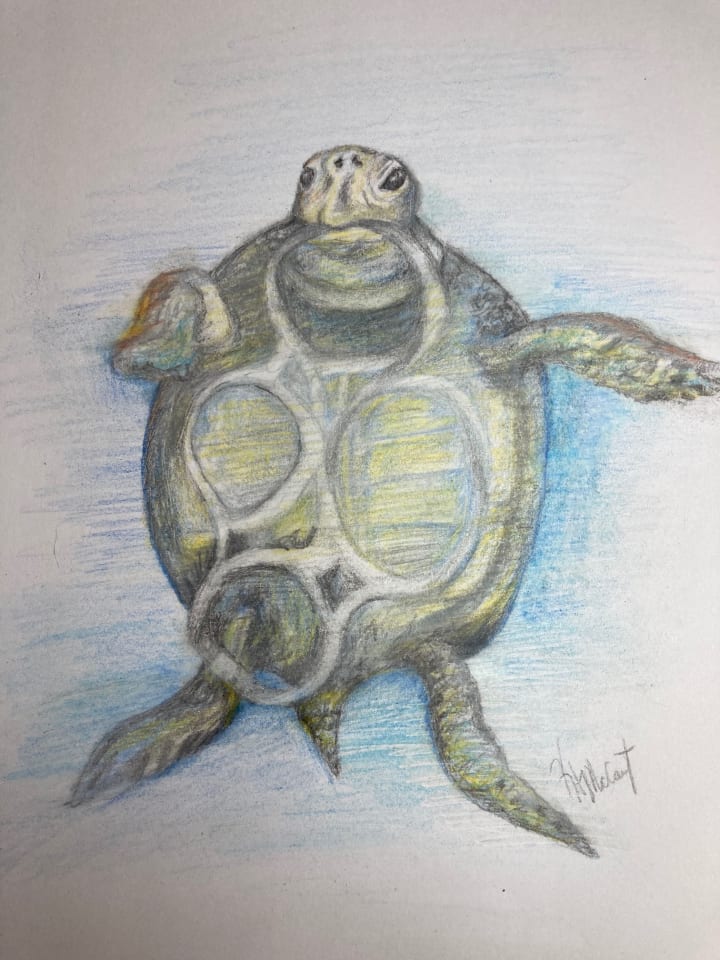Plastic Wars: Simple Lifestyle Swaps Can Save Marine Lives
Help Save Sea Turtles and Their Oceanic Friends - Stop Using Plastic and Use These Things Instead
Hi, nice to meet you! Sy the Sea Turtle here. I know you’re probably wondering why I used a bold outer space-style video intro crawl to grab your attention if I live in the ocean. First, I’m a huge fan of big-screen intergalactic battles to save the universe. Second, I caught your attention, didn’t I?
While I’ve never orbited the Earth in a spaceship or defeated a mortal enemy with a lightsaber, I have navigated deep oceanic frontiers that few humans have yet to explore. These unknown watery depths are my home – at least for now.
Sadly, deadly plastic pollutants are threatening my survival – and everything I hold dear is at risk. I was out for a swim yesterday and narrowly escaped those plastic rings that hold cans or bottles together:

Talk about scary! I’m always on the lookout for natural predators that want to enjoy a sea turtle snack. A shark is a prime example.
Warning: This battle is pretty intense – watch at your own risk! (Credit: Life Of Wild Animals - YouTube)
You might not realize it, but plastic pollution can kill me too. The thing is, I can’t distinguish a plastic grocery bag from a jellyfish. If I’m swimming along and see a plastic bag floating through the water, I can easily think it's my jellyfish lunch. This isn’t good.
Swallowing the bag can cause an intestinal blockage – or give me a false “full” feeling in my belly. Both of these things can cause me to die of starvation. Worse yet, if I swallow a sharp plastic item, it can cut my internal organs wide open.
Video Credit (Australian Academy of Science, YouTube)
Currently, seven different species of sea turtles are struggling to survive in waters around the world. They are: Green, Loggerhead, Hawksbill, Leatherback, Kemp’s Ridley, Olive Ridley, Luke Sky Turtle – just kidding! – and Flatback.
Sadly, our global population is shrinking. Plastic pollution poses one of the biggest threats to sea turtles' existence.
According to Conservation International, about 17.6 billion pounds of plastic trash is dumped into the ocean every year. By 2050, the ocean will contain more plastic than fish.
People Can Help Make It Stop.
Help me, kind human! Please do your part to keep plastic waste out of the ocean so that my fellow aquatic creatures and I can thrive, survive, and repopulate global waters.
It's really not hard. Making small lifestyle changes can REALLY MAKE A HUGE DIFFERENCE.
Lori, who is writing this article on my behalf (because Sea Turtles can't type well with wet, slippery feet!), suggests making these easy plastic swaps to help keep me keep swimming:
1. Use Stainless Steel Straws Instead of Plastic
A smart and compassionate boy named Milo Cress launched the Be Straw Free Campaign in 2011 when he was only 9-years-old. Gathering data from straw manufacturers, Milo discovered that Americans use over 500 million plastic straws every day.
Unfortunately, plastic straws are treacherous for sea turtles. They can easily get wedged inside a turtle's nostrils blocking their airways. If they ingest them, the nonbiodegradable material stays lodged in a turtle's stomach or intestinal tract.
One simple solution is to follow coffee franchise giant Starbucks' lead and stop using any kind of straw altogether and just sip your drink straight from the cup.
Thankfully, there are several eco-friendly options for those who enjoy sipping a beverage through a straw. A popular choice (and my favorite) is a stainless steel straw. They are washable, reusable, and many brands come with a small cleaning brush (like a mini bottle brush) for easy cleaning.
2. Pack Purchases in Reusable Cloth Bags Instead of Plastic Handle Bags
According to the Environmental Protection Agency (EPA), people use over one trillion plastic bags each year worldwide, with over 380 billion of those bags and wraps used in America. The U.S. total alone requires 12 million barrels of oil to produce. Like so many other plastics, these bags don't break down.
To lower your carbon footprint and help prevent turtles and other sea creatures from ingesting or getting tangled up in plastic shopping bags, pack your groceries and other purchases in reusable cloth bags that you bring back and forth to the store from home.
Target, Walmart, and Meijers are just three retailers that offer reusable cloth bags for purchase inside the store. You can stock up on those, or bring any other kind of tote bag from home that works best for you.
I frequently find that the cloth, reusable bags are sturdier for heavier items like milk jugs, soup cans, spaghetti sauce jars, and more.
3. Don't Buy Single-Use Plastic Bottle Drinks
Interesting Fact: Sea turtles only drink seawater. So, they expel the salt out of what they drink through special “salt glands” behind their eyes.
When we get thirsty, grabbing a single-use bottle of water, soda, or iced tea is convenient - especially when packing lunch for school or work, hitting the gym, going hiking, or many other scenarios.
Tossing those bottles into the trash adds to the overcrowded landfill waste. Because they don't break down for hundreds of years, the bottles end up in oceans - either whole or as microplastics - and unknowing turtles and other marine life ingest them and die.
Video Credit (Ted-Ed - Emma Bryce Lesson/Animation Sharon Colman/YouTube)
An easy, turtle-saving solution is to ditch single-use plastic beverage bottles and tote (and enjoy) your drink du jour in an eco-friendly reusable water bottle/tumbler.
A bonus: Drinking water from a reusable cup/bottle lowers your carbon footprint. Research shows that consuming 800 bottles of bottled water per year is equal to 350 lbs. of CO2.
4. Take Reusable Plates, Utensils, and Cups on Picnics Instead of Plasticware
Disposable plastic plates, cups, and utensils are popular picnic items. However, pitching out plasticware that never decomposes harms marine life and the environment.
A simple swap: Pack real plates, silverware, and cups from home for your next beach picnic or backyard barbecue with friends. Ultimately, washing and reusing dishes reduces household waste and curbs plastic pollution.
Sy the Sea Turtle and all his oceanic friends urge you to help end Plastic Wars and help preserve the ocean. May the flippers be with you!
Video Credit Amazing Earth, YouTube






Comments
There are no comments for this story
Be the first to respond and start the conversation.